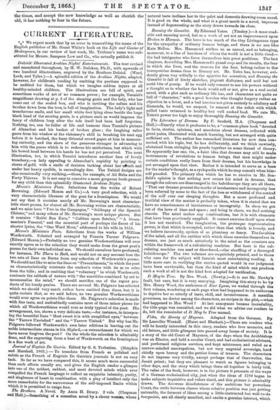The Literature of Dreams. By F. &afield, M.A. (Chapman and
Hall.)—Exactly what it professes to be, a "common-place book "devoted to facts, stories, opinions, and anecdotes about dreams, collected with great pains, illustrated with much learning, but not arranged with quite sufficient art. The author has ransacked literature for now data con- nected_with his topic, but he has deliberately, and we think unwisely, abstained from stringing his pearls together on some thread of theory. He apparently has one, viz., a faint idea that dreams may still be made instruments of revelations to human beings, that men might under certain conditions really learn from their dreams, but his knowledge is not arranged upon that view. Rather it is intended to serve as a base for the reader's thought, as a cyclopaadia which he may consult when him- self puzzled. The primary idea which he has to receive in Mr. Sea- field's opinion is that nothing new enters his mind in dreams, that. though the colours are disarranged in the kaleidoscope they are all there. "That our dreams present the marks of inooherence and incongruity has been referred by some to the fact of the loss or withdrawal of the control of the will over our sleeping thoughts. But a more profound and. truthful view of the matter is probably taken, when it is stated that we have no consciousness of incoherence or incongruity. In sleep we get. out of the laws of time and space ; and being in chaos, we find nothing chaotic. The mind makes any combinations, but it is with elements that have been previously supplied. It cannot exercise itself upon what it has not received. The imagination, the grotesque representative power, is that which is occupied, rather than that which is loosely, and. we believe incorrectly, spoken of as phantasy or fancy. The faculties of the mind, and all the entities with which these exercise themselves in. dreams, are just as much anteriorly in the mind as the counters are within the framework of a calculating machine. But here is the cal- culating machine run mad or disordered,—the shuffling of a deranged kaleidoscope." The two volumes are exquisitely printed, and to those who care for the subject will furnish most entertaining reading. A. little more care in verifying the stories quoted would in our judgment have been serviceable, but then the kind of mind which can producs such a work at all is not the kind best adapted for verification.


































 Previous page
Previous page